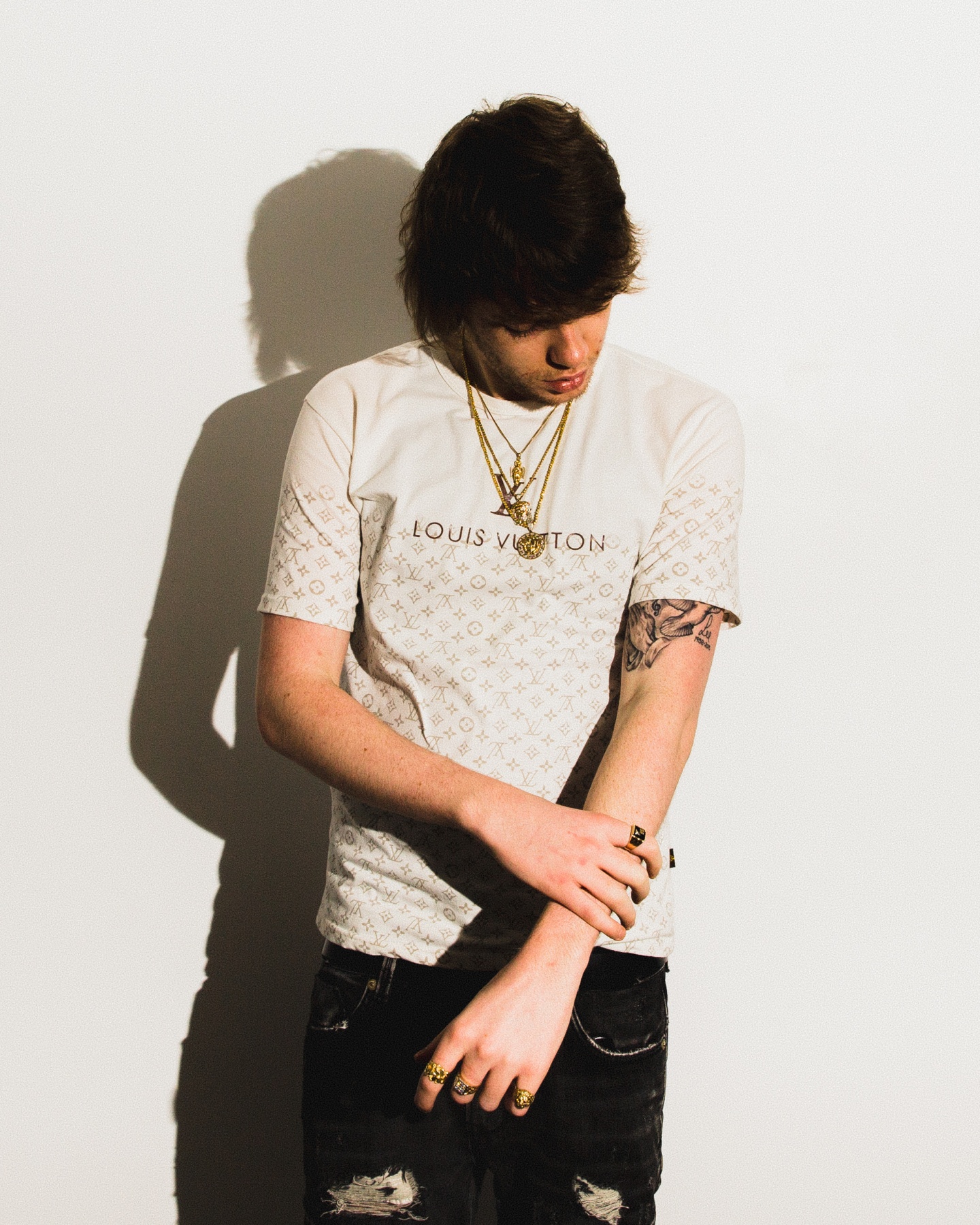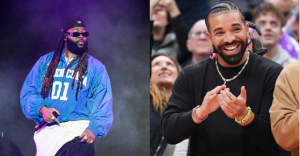 Courtesy Murda Beatz
Courtesy Murda Beatz
Raised in Fort Erie, Ontario, 22-year-old producer Murda Beatz got his start as an in-house producer with Migos, producing 2015’s relentless “Pipe It Up,” and this year landed major collaborations with Gucci Mane (“Back on Road”), PARTYNEXTDOOR (“Like Dat”), and French Montana (“No Shopping”). Murda, whose real name is Shane Lindstrom, connected with that marquee talent over social media, but has also made an effort to meet guys like Chief Keef and Quavo in person, rather than sending beat packs over email. He’s cultivated relationships within their camps, and expanded his network through old-fashioned word of mouth.
“I never wanted to work a 9 to 5. I was always a different kid in class,” Murda said recently, over the phone from a studio session in L.A. “I always asked my mom, ‘Why am I left-handed? Why is everyone right? Why am I different?’ I just knew I was different from everyone else. I still feel like that today, sitting in rooms with people.”
Murda spoke with The FADER about traveling to America to jumpstart his career, and the relationships that have propelled him so far.
What was your upbringing like?
I grew up with my parents always listening to rock music. My dad wanted me to play guitar, but I always had more of an ear for drums. He really wanted me to be a guitar player, like him. I was like “Nah, I like to play drums.” My uncle was like, “Yeah, that’s cool, then we can all jam together.” They play guitar, I play drums. I was playing my uncle’s drums until I got a Pearl [drum set] in my early teens. It was an all-black Pearl. I played at school functions and stuff. Talent shows.
Was your dad in a band?
No. He always had a passion for music and always wanted to do something in music, but just never had the opportunity to do it. When he saw me being able to do what I wanted to do, he was all for it and believed in me. One of the only people in my life to believe in me from jump.
When did you start making beats?
I started producing when I was 17. I went to a high school called Fort Eerie Secondary School. It’s kind of not that nice of a school. I started to focus on music at the end of high school, so I didn’t even want to graduate. But my mom wanted me to graduate, so I did.
How’d you learn to produce?
Some friends of mine showed me FruityLoops and I started clicking away. And then I just stayed home a lot of that summer. Just learning. I pretty much completely taught myself. I was gonna make beats for a friend that was freestyling, and I wanted to make some beats for some upcoming rappers in Toronto as well.
Were you exclusively working on FruityLoops?
I had an electric drum set. But right after I got FL [Studio] on my own computer, I sold my pair of electric drums. I went to Guitar Center and traded it in for an AKAI MPK49 keyboard,so I could start making beats with the piano. And eventually got KRK Speakers. I had my first placement three months into producing, with Soulja Boy.
Did you look to Toronto for inspiration as you were getting started?
Some of my friends were telling me that I should be waiting until I get better, and trying to build up artists in Toronto. At the time, I was like, “I’m not gonna really wait.” I’m 18. I’m just gonna go to Chicago and get work with the Chief Keefs and go out and build my name in America off of social networks and stuff. Cause I knew that’s how I get bigger faster than just sitting at home. When I started five years ago, Lex Luger was really big, and Southside. Toronto wasn’t that poppin’ at the time.
How’d you go about making a name for yourself in America?
I went to Chicago and tried to get big in the drill scene. With GBE, Lil Durk, all those guys. Then I wanted to get my music into Atlanta. Found these guys the Migos on the internet before they blew up. Started sending beats to Skippa Da Flippa. He started showing them my beats. From there, they started liking the stuff, and they blew up. They started flying me out and I started living with them, around 2012, 2013. Going on the road with them. That’s how we built our good relationship that we have now. I’m glad that we still have that close bond. Now, I can help them in ways and they can still help me in ways.
Did you ever consider going to college?
I was gonna go to a music college in Toronto, but at the time I was like, “Nah, it’s not worth it to spend the money. I rather teach myself.” I learned early in the game that it is better to move around and meet people and build relationships. It is better to build these relationships in person than just to send beats. There’s thousands and thousands of producers who send beats and just pray that someone will record on something. When you really start to travel around, you realize that building personal relationships in the industry is better. I really only work with people that I have a relationship with. No one is really throwing me in the room with people to work with. I work with who I want to work with.
What was the session for “Pipe It Up” like?
I’d just got to the house in Atlanta. It was like 10 or 11 at night. [Migos] were drinking Hennessey. I never really see them drinking alcohol. They’re never drinking liquor. So I was like, “Oh, you guys are drinking Henny? Alright. Let’s drink some Henny tonight.” We started drinking Henny and I started playing all the new beats I brought with me. I was playing Quavo beats and I skipped over that beat. And Quavo was like, “Wait, go back to that beat.”
So I was playing it and he was like: Pipe it up, pipe it up, pipe it up. I was like, “Yo, just go in and record that. Just go. Don’t think about it.” When he came out he was like, “Man, this is fun. This is exactly how we made ‘Versace.’” He finished the verse and in the next couple of days Takeoff did his verse to it. I knew when we made that hook that song was going to be big. Quavo knew too. We all knew.
Why do you and the Migos get along so well?
We just have good chemistry. I know their families and stuff. It’s been three to four years now, so that bond can’t really be broken. We are always going to be making music together.
Boi-1da is one of your mentors. How did you connect with him?
I met [Boi-1da] a bunch of times in Toronto. The first time, I met him at a Rich Homie Quan and Wiz Khalifa show backstage. I started talking to [his camp] more and started going to his house and making beats with him. I learned a lot making beats with him, about mixing and everything. He’s a guy that I looked up to in the industry. He’s a very humble guy. He’s very successful.
In his Beat Construction interview, Boi-1da called producing a “team sport.” Do you agree with that?
There’s more people on beats now. People are collaborating. People are using samples. People are just taking elements from other people and producing records together. It’s kind of like in the pop world, where there is four people on beats. I feel like that’s happening more in urban music as well. It’s good to see that. I am actually producing records and bringing people in for certain things. Molding records together. Co-producing after records are made and placing them as well.
You’re one of three producers credited on Drake’s “With You.” How did that one come together?
I got the sample from Cardiak. I did the record. I placed it, and then Nineteen85 touched stuff up at the end of the beat. So it was a good collaboration. It turned out to be, I’d say, one of the fan favorites on VIEWS.
What’s your relationship with PARTYNEXTDOOR?
Me and Party met a year and a half ago, in Toronto. We started chilling together and started to work together. We are really good at making music together. He’s a real genius. I feel like he’s one of the most influential artists of our time — at least of the last five years. He’s definitely influenced a lot of the R&B.
Are Party and Jeremih still working on a collaborative album, Late Night Party?
I don’t know what’s going on with that [project]. But [their song] “Like Dat” was a crazy, crazy club record. I made that beat on a plane from Miami to L.A., in the middle seat with iPhone headphones.
How do you find new sounds?
I see if producers I work with want to send me melodies they’ve created, or samples. There’s people out there that make their own samples. They sit in the studios and use all the hardware. Create samples and just chop them up. They compose music and chop it up and make samples out of it. Or we’ll go back into old samples. On VIEWS, Drake and 40 sampled old DMX records and stuff.
You tweet “Keep God First” a lot. Are you religious?
Well, I believe in God. I’m a very spiritual person, and parts of my family are Christian. I really started believing in God at the beginning of this music stuff. Everything that’s happened I have spoken into existence. Everything in my life, music wise, I’ve talked about and it has ended up happening. I definitely feel like God has a plan for everyone and has helped me along the way. I pray every day. Keep God first. Be specific for when asking for things.
